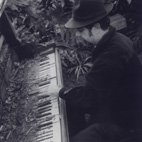Further to some comments I made on the Meanjin blog Spiked a few days ago in response to happy endings, which took the film adaptation of Cormac McCarthy’s The Road as a recent example, I wanted to write about the fleeting appearance and disappearance of the piano which turns up at odd moments in the film.
Regular readers might be aware that the piano’s shifting cultural role is something that fascinates me. Aside from a childhood spent learning to play and (mostly) enjoying the experience, I am intrigued as to how often pianos tend to pop up in contemporary culture. In recent years they have appeared in some unlikely places; see this limited edition Karl Lagerfeld Steinway, my earlier post about the Audi car company-designed grand, and this Swedish piano staircase classic on YouTube. The piano is a rather unstable sign of technological advancement and decline; of domesticity and public performance; of fun (playing) and hard work (learning and practicing); of virtue and virtuosity (think of the piano in Jane Austen’s Emma – a site of sexual intrigue between the accomplished musician Jane Fairfax and Frank Churchill).
In the film adaptation of The Road, the piano – which does not appear in the book – functions as an emblem of family life and of a lost world perfect in its imperfection. In flashbacks we see the mother playing as father and son look on admiringly, then later we see them destroying the instrument to keep the home’s fire literally burning. Inevitably the woman is the pianist, and inevitably it’s the woman who dies so that the father and son can travel the road. When the father remembers their old life, he does so by picturing his wife at the piano; and it is not until he discovers an old piano in a house off the road, functional but horribly out of tune, that he breaks down in front of his son for the first time. I was struck particularly by this scene because the piano stands out as one piece of technology that still ‘works’ in the film’s post-nuclear, post-apocalyptic world.

